I’m continually amazed by the immensity of the world that a small poem can conjure. In just a few lines or words, or even just a line break, a poem can travel across time and space. It can jump from the minuscule to the incomprehensible vastness of the universe. And in these inventive leaps, it can create, in our minds, new ideas and images. It can help us see connections that were, before, invisible.
John Shoptaw has conjured such magic with his poem, “Near-Earth Object,” combining the gravity of mass extinction on Earth with the quotidian evanescence of his sprint to catch the bus.
John Shoptaw grew up in the Missouri Bootheel. He picked cotton; he was baptized in a drainage ditch; and he worked in a lumber mill. He now lives a long way from home in Berkeley, California, where I was lucky enough to visit him last summer.
John is the author of the poetry collection, Times Beach, which won the Notre Dame Review Book Prize and the Northern California Book Award in poetry. He is also the author of On The Outside Looking Out, a critical study of John Ashbery’s poetry. He teaches at the University of California, Berkeley.
John has a new poetry collection coming out soon, also called Near-Earth Object.
This episode of Chrysalis is part of the Chrysalis Poets series. You can listen on Substack, Apple Podcasts, and other podcast platforms.
Please rate, review, and share to help us spread the word!
John Shoptaw
John Shoptaw is a poet, poetry reader, teacher, and environmentalist. He was raised on the Missouri River bluffs of Omaha, Nebraska and in the Mississippi floodplain of “swampeast” Missouri. He began his education at Southeast Missouri State University and graduated from the University of Missouri at Columbia with BAs in Physics and later in Comparative Literature and English, earned a PhD in English at Harvard University, and taught for some years at Princeton and Yale. He now lives, bikes, gardens, and writes in the Bay Area and teaches poetry and environmental poetry & poetics at UC Berkeley, where he is a member of the Environmental Arts & Humanities Initiative. Shoptaw’s first poetry collection, Times Beach (Notre Dame Press, 2015), won the Notre Dame Review Book Prize and subsequently also the 2016 Northern California Book Award in Poetry; his new collection, Near-Earth Object, is forthcoming in March 2024 at Unbound Edition Press, with a foreword by Jenny Odell.
Both collections embody what Shoptaw calls “a poetics of impurity,” tampering with inherited forms (haiku, masque, sestina, poulter’s measure, the sonnet) while always bringing in the world beyond the poem. But where Times Beach was oriented toward the past (the 1811 New Madrid earthquake, the 1927 Mississippi River flood, the 1983 destruction of Times Beach), in Near-Earth Object Shoptaw focuses on contemporary experience: on what it means to live and write among other creatures in a world deranged by human-caused climate change. These questions are also at the center of his essays “Why Ecopoetry?” (published in 2016 at Poetry Magazine, where a number of his poems, including “Near-Earth Object,” have also appeared) and “The Poetry of Our Climate” (forthcoming at American Poetry Review).
Shoptaw is also the author of a critical study, On the Outside Looking Out: John Ashbery’s Poetry (Harvard University Press); a libretto on the Lincoln assassination for Eric Sawyer’s opera Our American Cousin (recorded by the Boston Modern Orchestra Project); and several essays on poetry and poetics, including “Lyric Cryptography,” “Listening to Dickinson” and an essay, “A Globally Warmed Metamorphoses,” on his Ovidian sequence “Whoa!” (both forthcoming in Ovid’s Metamorphoses and the Environmental Imagination at Bloomsbury Press in July 2023).
“Near-Earth Object”
By John Shoptaw
Unlike the monarch, though the asteroid also slipped quietly from its colony on its annular migration between Jupiter and Mars, enticed maybe by our planetary pollen as the monarch by my neighbor’s slender-leaved milkweed. Unlike it even when the fragrant Cretaceous atmosphere meteorized the airborne rock, flaring it into what might have looked to the horrid triceratops like a monarch ovipositing (had the butterfly begun before the period broke off). Not much like the monarch I met when I rushed out the door for the 79, though the sulfurous dust from the meteoric impact off the Yucatán took flight for all corners of the heavens much the way the next generation of monarchs took wing from the milkweed for their annual migration to the west of the Yucatán, and their unburdened mother took her final flit up my flagstone walkway, froze and, hurtling downward, impacted my stunned peninsular left foot. Less like the monarch for all this, the globe-clogging asteroid, than like me, one of my kind, bolting for the bus.
Recommended Readings & Media
John Shoptaw reading from his collection Times Beach at the University of California, Berkeley.
Transcript
Intro
John Fiege
I’m continually amazed by the immensity of the world that a small poem can conjure. In just a few lines or words, or even just a line break, a poem can travel across time and space. It can jump from the minuscule to the incomprehensible vastness of the universe. And in these inventive leaps, it can create, in our minds, new ideas and images. It can help us see connections that were, before, invisible.
John Shoptaw has conjured such magic with his poem, “Near-Earth Object,” combining the gravity of mass extinction on Earth with the quotidian evanescence of his sprint to catch the bus.
I’m John Fiege, and this episode of Chrysalis is part of the Chrysalis Poets series.
John Shoptaw grew up in the Missouri Bootheel. He picked cotton; he was baptized in a drainage ditch; and he worked in a lumber mill. He now lives a long way from home in Berkeley, California, where I was lucky enough to visit him last summer. You can see some of my photos from that visit at ChrysalisPodcast.org, alongside the poem we discuss on this episode.
John is the author of the poetry collection, Times Beach, which won the Notre Dame Review Book Prize and the Northern California Book Award in poetry. He is also the author of On The Outside Looking Out, a critical study of John Ashbery’s poetry. He teaches at the University of California, Berkeley.
John has a new poetry collection coming out soon, also called Near-Earth Object.
Here is John Shoptaw reading his poem, “Near-Earth Object.”
---
Poem
John Shoptaw
“Near-Earth Object”
Unlike the monarch, though
the asteroid also slipped
quietly from its colony
on its annular migration
between Jupiter and Mars,
enticed maybe by
our planetary pollen
as the monarch by my neighbor’s
slender-leaved milkweed.
Unlike it even when
the fragrant Cretaceous
atmosphere meteorized
the airborne rock,
flaring it into what might
have looked to the horrid
triceratops like a monarch
ovipositing (had the butterfly
begun before the period
broke off). Not much like
the monarch I met when I
rushed out the door for the 79,
though the sulfurous dust
from the meteoric impact
off the Yucatán took flight
for all corners of the heavens
much the way the next
generation of monarchs
took wing from the milkweed
for their annual migration
to the west of the Yucatán,
and their unburdened mother
took her final flit
up my flagstone walkway,
froze and, hurtling
downward, impacted
my stunned peninsular
left foot. Less like
the monarch for all this,
the globe-clogging asteroid,
than like me, one of my kind,
bolting for the bus.
---
Conversation
John Fiege
Thank you so much. Well, let's start by talking about this fragrant Cretaceous atmosphere that metorizes the airborne rock, which is is really the most beautiful way I've ever heard of describing the moment when a massive asteroid became a meteor, and impacted the earth 66 million years ago, on the Yucatan Peninsula. And that led to the extinction of about 75% of all species on Earth, including all the dinosaurs. This, of course, is known as the fifth mass extinction event on earth now, now we're in the sixth mass extinction. But but this time, the difference is that the asteroid is us. And, and we're causing species extinctions at even a much faster rate than the asteroid impact did, including the devastation of the monarch butterfly, which migrates between the US and Mexico not far from the Yucatan where the asteroid hit. And in your poem, these analogies metaphors parallels, they all bounce off one another. parallels between extinction events between humans and asteroids between planets and pollen, between monarch eggs and meteors between the one I absolutely love is the annular migration of asteroids in the annual migration of monarchs. But in some ways, the poem puts forward an anti analogy a refutation of these parallels you know, you say multiple times things like unlike the, monarch unlike it, not much like the monarch less like the monarch. So So what's going what's going on here? You're you're giving us these analogies and then and then you're taking them away.
John Shoptaw
The ending of Near Earth Object is a culmination of fanciful comparisons. In this regard it resembles Shakespeare's Sonnet 130. And you probably know this, John, And that poem proceeds—Shakespeare’s—through a series of negative similarities, which I call dis-similes. And at the end, the poem turns on a dime in the final couplet, which is, “and yet, by heaven, I think my love as rare as any she belied with false compare.” Now, I didn't have Shakespeare's poem in mind—probably good—when I wrote Near Earth Object, but I was certainly familiar with it. And my poem goes through a series of far-fetched similarities between a monarch butterfly and the Chicxulub asteroid, we follow the lifecycles of these two and then a third character, the first person I enters the poem comes out the door, and then gets, you know, hit by the asteroid monarch on penisular left foot. That turn at the end, to comparing the asteroid to me, one of my kind, would seem equally farfetched. What can I have to do with the globe-clogging asteroid? Before climate change, the answer would have been nothing. This poem couldn't have been understood, wouldn't have made sense. Now, we're caught out by the unlikely similarity that, you know, humankind has the geologically destructive potential of the life-altering asteroid.
John Fiege
I love that the idea of that turn partially because it's so much pulls out the power of poetry, and the power of poetic thinking, where, you know, so much environmental discourse is around rationality, of making rational, reasonable arguments about this is how things are, this is how things ought to be. But when you have this kind of turn, you're you're kind of highlighting the complexity, and the complicated nature of understanding these things, which are really complex. And it really, you know, in such a short poem, you can encapsulate so much of that complexity, which I think benefits our ultimate understanding of, of what we're grappling with, with these environmental questions.
John Shoptaw
Yeah, that's very well put. I think that this poem is a kind of psychological poem as well, and that I'm playing on the readers expectations. And I think the reader probably has less and less faith in this persona, who keeps keeps being lured into these weird comparisons between the asteroid and and the and the monarch butterfly. And then at the end, we're thinking, well, this, too, is absurd. And then we're caught up, like I say, and that's the psychological turn, you know, early on, when people and people still many people doubt. The existence of climate change. It's just because of a matter of scale. How can we affect Mother Nature, right? It's so big, it's so overwhelming. It does what it wants. We're just little features on this big, big planet. So that it's so counterintuitive. So that's why yes, we grapple and this poem is meant to take you through that kind of experience. That without saying that explicitly, and I think that's something that, yeah, it sets this apart from both the psychological essay and an environmental essay,
John Fiege
Right the other line I want to pull out of this is slender leaved milkweed. Which I love. and there is a musicality to it. How do you about that? sonorous aspect of the poem and the musicality and the rhythm of it.
John Shoptaw
Yeah, Thank you for that question. Its one of the ways I beleive that poetry is like music. We do have a musicality and one of the wonderful things about poetry and music is that it it works below the level of meaning. A way a song often does. You know you often will before you even know all the words will get the song. And understand what the song is comunicating and sometimes I am communicating delicacy in slender leaved milkweed. Not only by the image, but by the sound. Its a quiet line. Whereas when I say airborne rock, that's very tight. And very definitive, like globe clogging asteroid or bolting for the bus. These are dynamics that I can play with, and I can accentuate them by changing the rhythms making to very hard plosive as an explosion, you know, b sounds far from each other. And this is something that poetry can do, that prose can't. So well. And that, you know, it's one reason why you have soundtracks and film to help bring things across.
John Fiege
Yeah, and then in the midst of, of some of these grand images that you have in the poem of like monarch colonies and asteroid colonies, there's also your presence, and the glimpse of them of what seems like a moment in your life, potentially, you run out the door and catch the 79 bus, which goes through Berkeley where you live. And and you encounter a monarch butterfly, which also has a California migration route. The monarch impacts your, as you say, stunned, peninsular left foot. And so now you're shifting the metaphor from human as asteroid to human as Yucatan peninsula, which is the site the site of the impact. And the way you you play with scale. In this poem, I find quite remarkable moving from the asteroid belt between Jupiter and Mars to your foot. And in your peninsular foot makes me feel as if humans are both the perpetrators of the sixth mass extinction, but also one of its victims. And so I was curious, was this moment with the butterfly is something that actually happened? And how do you understand it? In relation to that, you know, this small moment with the butterfly? How do you understand that in relation with the broader context of the poem?
John Shoptaw
Yeah, thank you. I, I think, one way I proceed. And in poetry, which is something like chance operations that John Cage and poets following John Cage would use as I become very receptive to things happening around me. And if something happens around me while I'm writing a poem, then it gets to come in the poem, at least I am receptive to that possibility. And as I was going for the bus one day, on the walkway, I came across a dead monarch butterfly was very startled to see it. And I thought, Oh, my God, that pet needs to be in the poem, this butterfly has fallen out of the sky like the asteroid. And so and it turned out that the third thing I needed to link our personal, small felt scale with the astronomical and the geological timescale. And it's exactly the problem of scale, both in space and time. I'm constantly zooming in and zooming out. I actually wrote one poem in which I compare this surreal or unreal feeling that we have, if not a knowledge but a feeling of climate change behind the weather as a hit the Hitchcock zoom, where the background suddenly comes into the foreground, right?
John Fiege
Yeah, and it seems like, you know, the problem of climate change is a problem of scale like, like it's so it's so foreign to our kind of everyday human senses of, of what is danger, and what is something we should be concerned about or care about it. And that problem of scale both, both spatially and temporally. It really prevents us from wrapping our heads around what it means and how to respond.
John Shoptaw
It does. That's our challenge. I take it as my challenge, for the kind of poetry I write. And I think of of poetry as a science of feelings. And one of the feelings I'm thinking about and trying to understand and work through is denial. You know, people usually think of denial as refusal, you refuse to admit, but look at the facts just face the facts. But as you say, climate is on such a different scale. It's often a problem of incomprehension.
John Fiege
Yeah, and I think this idea of denialism I mean, we tend to talk about it in very narrow terms of, you know, people of particular political persuasions deny the existence of climate change. And that's one like, very narrow view of denialism. But it really pervades everything in our culture, you know, anyone who eats a hamburger, or flies on a plane, or, or even turns on their, their heat in their house, you know, is is in is kind of implicated in some system of denial. That, you know, ultimately, our societies completely unsustainable. And we have to function we have to move forward, even though even if we know how problematic those various things are. And so just living in the world requires, you know, some sense of denialism.
John Shoptaw
It does, if you think of the word we commonly used today, adaptation, though, it's really another word for denial. If you see what I mean, we're, we're moving into accepting, partially accepting the reality as it is, so we can live into it. And again, if we think of relativity, flying less, not giving up flying, emitting less, not stopping all the way emissions on a dime, right, but moving as fast as we possibly can, these are things we can do and without being incapacitated by despair. And again, I think, you know, hope and despair are two other very fundamental concepts that poets if they're serious about feeling, can think about and think through and help people we understand.
John Fiege
Yeah, and I love this idea of impurity that you bring in. Not just with poetry, but, you know, I feel like environmentalism in general is, it's really susceptible to this kind of ideology of purity. And it becomes about, you know, checking all the boxes of, of, you know, lifestyle and beliefs and votes and all kinds of things where solutions, solutions don't come with some kind of attainment of purity. They come with it a shift of a huge section of the way the culture works. And that's never going to be perfect or consistent or anything. It's going to be imperfect, and it's going to be partial, but it can still move.
John Shoptaw
That's right. So when people say net zero, carbon offsets, recycling, this is all greenwashing. I say, listen to the word all. Yes, there is some greenwashing going on there. There is some self promotion and maintenance of one's corporate profile at work. But there's also good being done. You can recycle aluminum, and you get 90% aluminum back. You can recycle plastic, you get 50% back, but you still get 50% back.
John Fiege
Well, in the poem, you also give life to what we ordinarily see as inanimate objects. So let me let me reread a section of the poem enticed maybe by our planetary pollen as the monarch by my neighbor's slender leaves milkweed unlike it, even when the fragrant Cretaceous atmosphere media rised the airborne rock, flaring it into what might have looked to the horrid Triceratops like a monarch ovipositing. So in your words, the lifeless, inanimate asteroid is given life and a soul really? Why take it in that direction?
John Shoptaw
To make it real, to make it real for us. And you will see poets, giving a voice to storms to extreme weather events, seeing things from potentially destructive point of view. And that's what I was doing here is seeing things fancifully from the the meteor’s point of view, but I wanted to give that personification to make the link that this is personal. What's happening at this scale, is still personal, it still has to do with us and links with us.
John Fiege
Yeah, and you wrote this great piece for Poetry Magazine called “Why Eco Poetry” and you bring up these these topics a bunch. And there's one line. I really love, you say, to empathize beyond humankind, eco-poets must be ready to commit the pathetic fallacy and to be charged with anthropomorphism could could you explain this, this concept of John Ruskin's pathetic fallacy and how you've seen these issues play out?
John Shoptaw
I think Ruskin had certainly the good sense of what the natural world was. And many artists and poets laziness, when it came to the describing the natural world. storms were always raging, winds were always howling, the words were always that's really what he was getting at. And I appreciate that. You want to make these things real, right. But there is there is a place for pathetic fallacy. But on the other hand, strategically, we often need for that monologue of the lyric poem, to be overtaken by this larger voice, almost like a parental voice from on high, speaking to us and saying, Listen to me, this is real. This is happening. I'm out here. Right? So you've forced me to take over your poem and talk to you about anthropomorphism is, is related phenomenon. And it's it's a word that I, I still find useful and making us really consider and experience the outside world, the world, particularly of other creatures, as they actually are. However, it's a belief it's not a scientific idea. And the idea being that we are ascribing qualities or human qualities to animals or plants, or even inanimate objects, like like meteors. When in fact, when it comes to animals, for instance, we're often identifying qualities behaviors, actions, motivations, we share anyone who owns pets knows pet they have a range of feelings that to say, my dog is happy. My dog is bored. My dog is feeling bad because it feels it's disappointed me in some way, you know, these things are real. And you need to act accordingly to keep things going along. In the canine / human cup, you know, partnership that you have going there.
John Fiege
Yeah, Descartes must not have had any dogs or cats or ever encountered another animal besides a human in his life.
John Shoptaw
That's right. It's partly, you know, one feels, how can we know that other world? We shouldn't be so arrogant in our knowledge. And so it seems like we're being modest, and it's a good thing. And we have this anthropological attitude toward the relativity of, you know, consciousness. On the other hand, it's a form of denial, right? anthropomorphism is a form of denial of what we share and poets need to overcome that denial.
John Fiege
You mean, you mean anti-human anti-anthropomorphism?
John Shoptaw
Yeah, it's what I know. We don't have the language for it. We don't have that word of the problem.
John Fiege
Anti-anthropomorphism, it just slips right off your tongue.
John Shoptaw
That's right.
John Fiege
Well this point you make about anthropomorphism reminds me really strongly of a story. I've heard Jane Goodall tell many times, she was hired to observe chimpanzees in the wild, and she gave them names. But she was reprimanded by by many in the scientific community, who said, a researcher should use numbers to identify chimps or any other animals they're studying, because scientists must be dispassionate to not confuse animal behavior with human behavior. And she identifies one of her most significant contributions to science as recognizing the individuality and personality and really the souls of non human animals. And that recognition fundamentally changed. Our scientific understanding of chimps and other animals in allow these massive breakthroughs in the field. And you seem to be arguing that with poetry, we're in a similar place in relation to the Earth where we need to find a new language that allows us to empathize more profoundly with the other than human residence of the planet. Does that sound? Does that sound right to you?
John Shoptaw
Very much, and really, with thinking and realizing that I'm an animal, as a human being. brought on a conceptual paradigm shift for me, unlike anything I've experienced, in my adult life, everything changed. And when I think, what are the animals think about this? How are they dealing with climate change? Etc. It's always revelatory for me to ask that kind of question. I'm looking at a book by Jane Goodall right now on my shelf called the Book of Hope. And something I've been thinking about a lot in relation to this, because animals have not given up and they don't give up until they they have to. An animal with say, a song bird in the clutch of a hawk knows it's over, and you shut down in order to minimize the pain and suffering. They know that, but they know not to do that prematurely. And I think, you know, often we met we think of hope and despair, as antonyms, but they're very intertwined with each other. I mean, the word despair, contains hope. It means that the loss of hope and there as there is a sense of false hope, where you, you keep hoping beyond the point of hope, where reality tells you there's no point in hoping there's also what I would call a premature despair. I don't know if you have run across the Stockdale paradox. I find it helpful. There's a writer on Jim Collins, who talked to Admiral Stockdale who was taken prisoner of war in Vietnam. And he, he survived through seven years and several incidents of torture. And he said, he was asked by Jim Collins, well, who didn't survive? And he said, well, the optimists who said the optimists were saying, Oh, we're going to because we're gonna be led out by Christmas. In the winter that didn't happen and say, Oh, well, we'll be released by Easter. When that doesn't happen and Christmas comes around again. They die. They die of a broken heart.
John Fiege
Oh, wow. I have heard that in broad terms. I don't remember that story, though. That's great.
John Shoptaw
Yeah, and the paradox is that you have hope, which is resolute. It's not pie in the sky hope, but it's hope that faces reality. And it's hoped that is more like courage. It's more like resoluteness hope. Hope is not easy. And it does not deny despair, and even allows you to relax for a moment and maybe weep. Maybe you say, Oh, my God, it's over. Before you come back and say, No, I'm still here. I can still help I can do what I can.
John Fiege
Right, right. Yeah, and I love how you say that. Eco poetry can be anthropomorphic, but it cannot be anthropocentric, which which flips both of these assumptions that are so deeply embedded in our culture.
John Shoptaw
Now, maybe I could say something about anthropocentrism.
John Fiege
Yeah, for sure.
John Shoptaw
It's a word that, I think is maybe in the dictionary now, but maybe not so familiar word, but you know, thinking of everything in the world, a revolving around us and and the universe. We're the universe's reason for being right. That would be the kind of the strongest sense of anthropocentrism
John Fiege
Another another form of heliocentrism.
John Shoptaw
Yes, that's right. That's absolutely right. That's why I one reason why I, at the beginning of Near Earth Objects, see things for the asteroids point of view, right? To give that kind of scale, but also shifting perspective. On the other hand, lyric poetry is inevitably anthropocentric. We as humans are inevitably anthropocentric. So our moving out of anthropocentrism in poetry is always going to be relative and strategic, and rhetorical and persuasive, never absolute.
John Fiege
Right and totally. Well, another interesting issue you confront in the article is didacticism and the risks of moralism in eco-poetry. And in talking about this, you evoke two poets. The first is Archibald MacLeish, the renowned modernist poet who wrote "a poem should not mean but be." But then you write, poetics wasn't always this way, for Horace, a poem both pleases and instructs. And I feel like this issue of moralism, and didacticism goes way beyond poetry to encompass environmentalism more broadly. How can a poem please instruct without preaching and being didactic?
John Shoptaw
Yes, that's, that's a question. Where there's no single answer every poem, for me poses the question differently. And part of the excitement part of the experimental nature of poems is you find a new answer every time to that problem, how not to be preachy, but to leave readers in a different place at the end of the poem, than they were at the beginning. my poem to move people from unlike to less like., if I if I can get them there, in a poem, I have moved him in a way and that's enough for me.
John Fiege
Well, let's look at the end of the poem. You write less like the monarch for all this, the globe clogging asteroid than like me, one of my kind bolting for the bus? It seems in some ways that you might be settling on an analogy in the midst of of all these intersecting parallels, the asteroid is less like the monarch and more like us, us who have killed the monarchs. Where Where do you feel like the poem lands in terms of making a statement like this and and offering up many conflicting ideas that readers have to contemplate themselves?
John Shoptaw
What would I say? I think when it comes to guilt or responsibility, as I was saying before, we don't want to think in absolute terms, where I'm as guilty as Exxon, I am not. But I still am right. I am still part of this, this world. That monarch butterfly died naturally after it planted its eggs. Its its, its days, her days were numbered. So, that that is part of this. But yet, I do. I do want to say and this is part of, I think, part of the one of the gestures of poetry in the Anthropocene, the era of climate change, a gesture of saying, I take responsibility, I take responsibility. And this is, this is one of the problems of saying, I give up, you know, there's no point in doing any more. We don't have that option. It's irresponsible to give up to ever give up. So I still, though want to say, even something who that has global potential for damage is connected with me good little me, had taking taking the bus because I'm wondering, I'm one of humankind, and we have this destructive potential. And on the other hand, we have this corresponding responsibility.
John Fiege
Yeah. And looking back on the title of the poem, it feels as if we, as humans, have what you might call like, a dual contradictory existence? As, as both we're both Earth objects. And we're near Earth objects. Oh, what do you what do you think about that?
John Shoptaw
Yes, I do. I like that ambiguity. I think, one of the, one of the chances, and the happy accidents of the monarch appearing in my poem, as I was writing it, without planning to have a monarch in it, one of the accidents was to take the monarch also, as a Near Earth Object Near Earth Object is one of these scientific concepts of usually a very large object, like a, like a comet, or an asteroid entering the Earth's gravitational pull. With potentially hazardous effects. But, you know, it can be anything near the earth. And if you take object, also in the title as a goal, my object is to bring us near the earth. not have us simply abstract ourselves, how do we do that - we abstract ourselves by saying, we're special.
John Fiege
I really like that too, because that also ties into this question of scale. You know, you can be near the earth by being, you know, 1000 miles away. Or you can be near the earth by hovering, you know, centimeters over it. And it can be conceptual to, you can be oblivious to the fact that you live on Earth, or you can be extremely aware that you are of in within and near the earth at all times. Yeah, I really like that. That's beautiful. I love how so many meanings come from this tiny little poem?
John Shoptaw
Well, may I say I was not in a godlike position with this poem. For me. poems are like gardens and that they're less intended and tended, and they they grow of their own and I just tried to be the best collaborator with the poem that I can and not to ignore when it's trying to tell me something like, I need a monarch in here. Not to ignore that.
John Fiege
Yeah. Well, can you end by reading the poem once again. I can thank you very much.
---
Poem
John Shoptaw
“Near-Earth Object”
Unlike the monarch, though
the asteroid also slipped
quietly from its colony
on its annular migration
between Jupiter and Mars,
enticed maybe by
our planetary pollen
as the monarch by my neighbor’s
slender-leaved milkweed.
Unlike it even when
the fragrant Cretaceous
atmosphere meteorized
the airborne rock,
flaring it into what might
have looked to the horrid
triceratops like a monarch
ovipositing (had the butterfly
begun before the period
broke off). Not much like
the monarch I met when I
rushed out the door for the 79,
though the sulfurous dust
from the meteoric impact
off the Yucatán took flight
for all corners of the heavens
much the way the next
generation of monarchs
took wing from the milkweed
for their annual migration
to the west of the Yucatán,
and their unburdened mother
took her final flit
up my flagstone walkway,
froze and, hurtling
downward, impacted
my stunned peninsular
left foot. Less like
the monarch for all this,
the globe-clogging asteroid,
than like me, one of my kind,
bolting for the bus.
---
Conversation
John Fiege
John, thank you so much for joining me today. This has been fabulous.
John Shoptaw
Thank you, John, for the opportunity. And I love conversing with you.
---
Outro
John Fiege
Thank you so much to John Shoptaw. Go to our website at ChrysalisPodcast.org, where you can read his poem “Near-Earth Object” and also see some of my photographs of him at his house in Berkeley and find our book and media recommendations.
This episode was researched by Elena Cebulash and Brodie Mutschler and edited by Brodie Mutschler and Sofia Chang. Music is by Daniel Rodriguez Vivas. Mixing is by Sarah Westrich.
If you enjoyed my conversation with John, please rate and review us on your favorite podcast platform. Contact me anytime at ChrysalisPodcast.org, where you can also support the project, subscribe to our newsletter, and join the conversation.

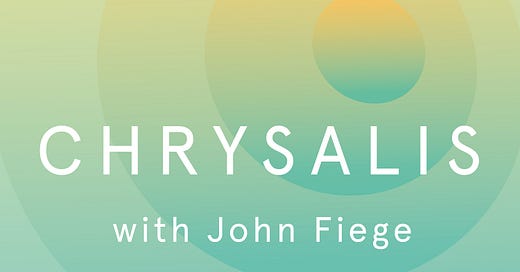
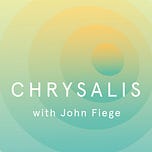


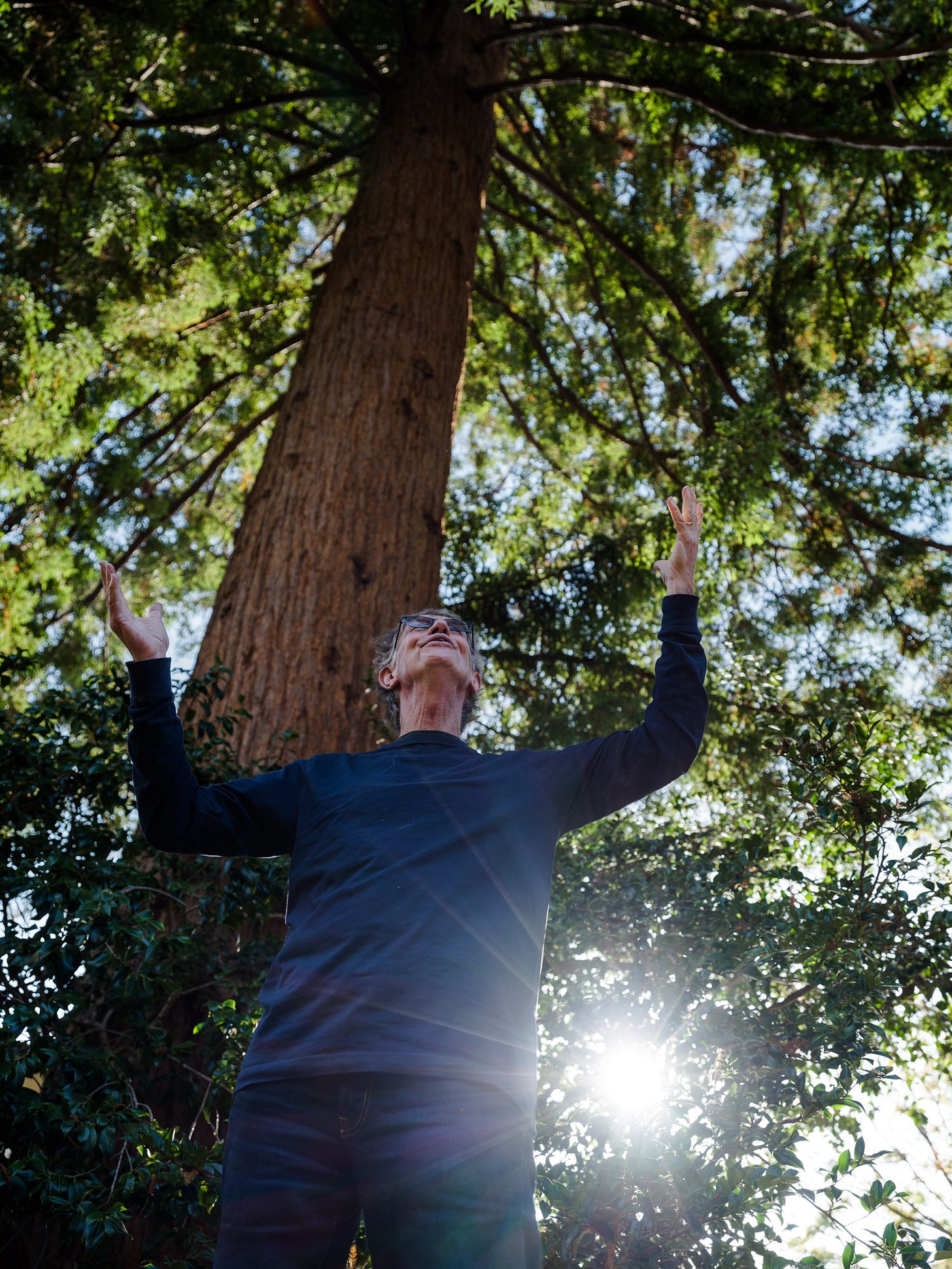
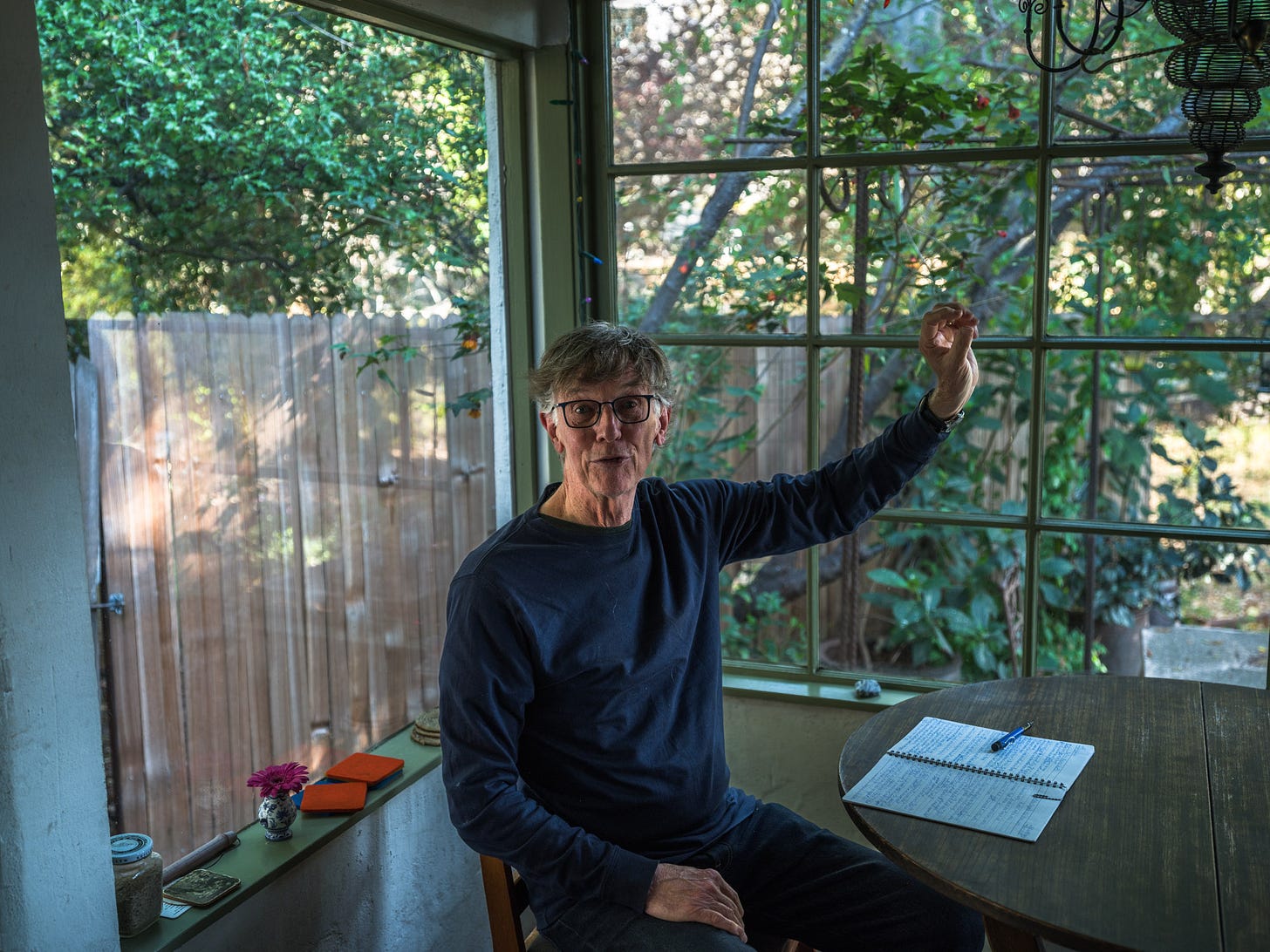

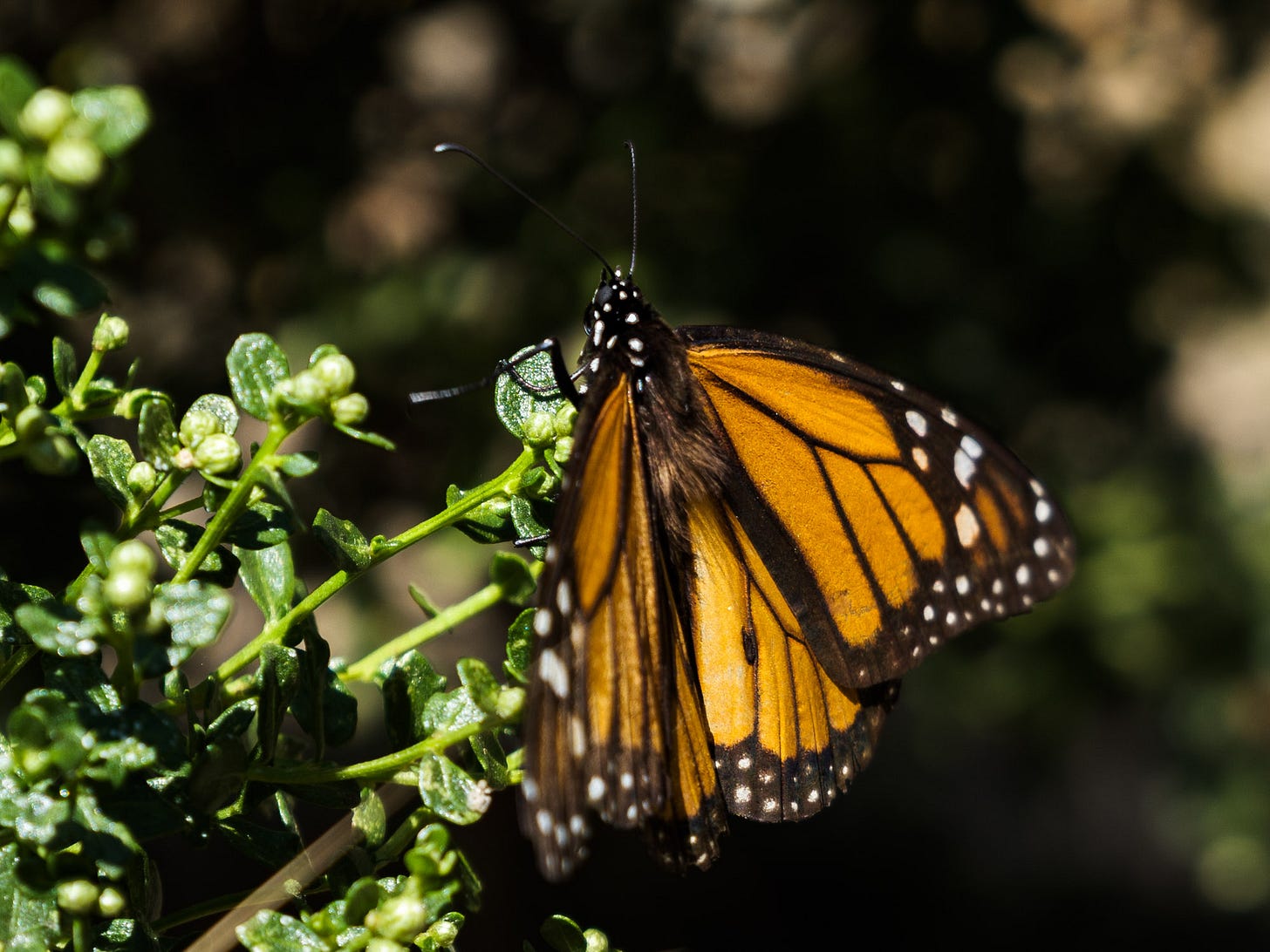


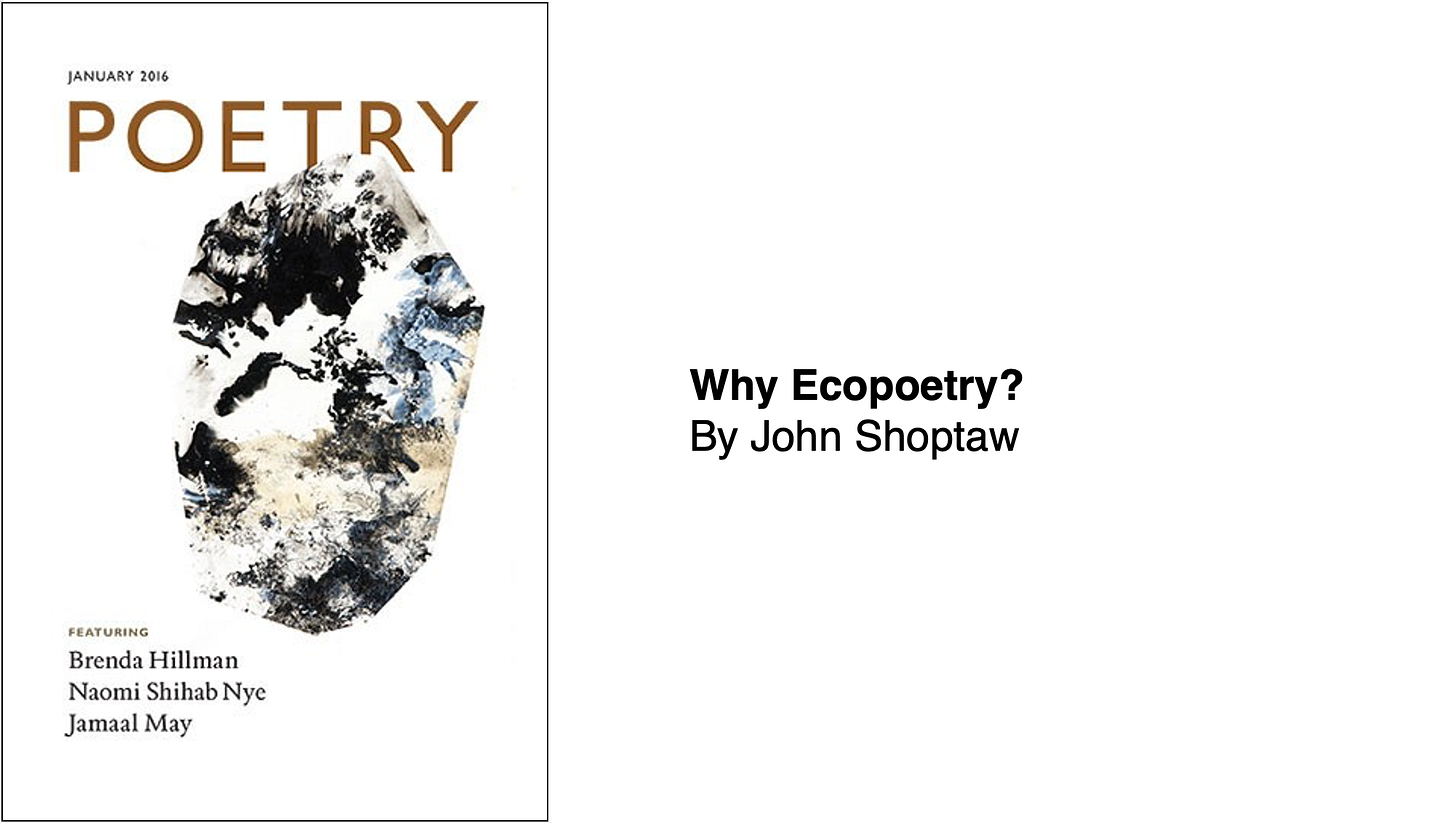




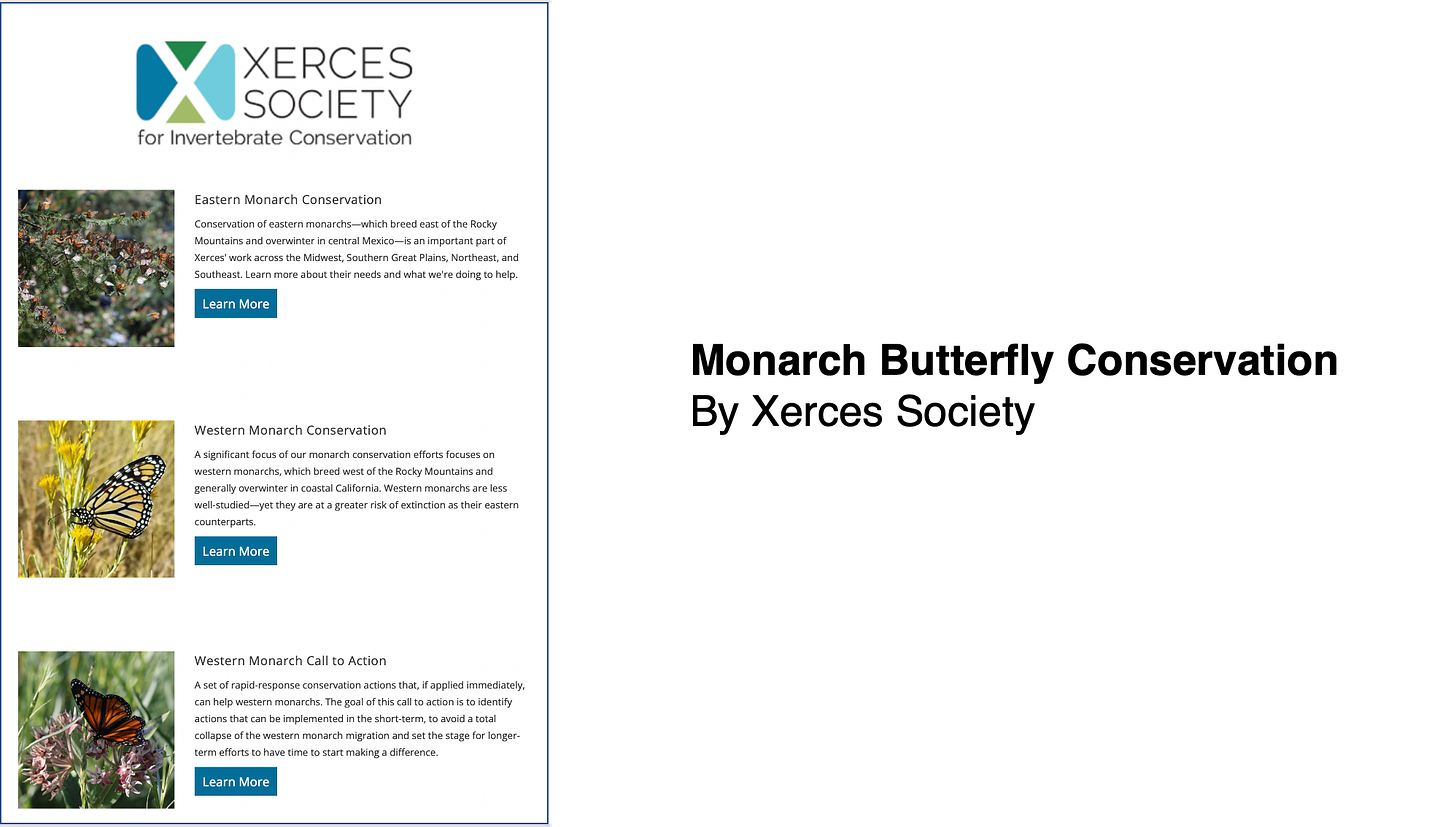

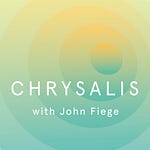
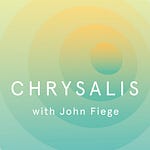
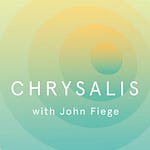
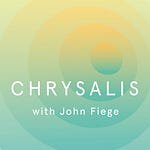
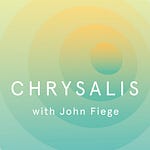
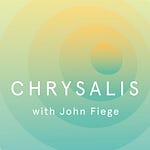
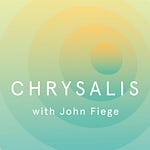
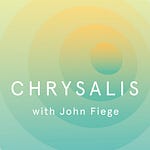
Share this post